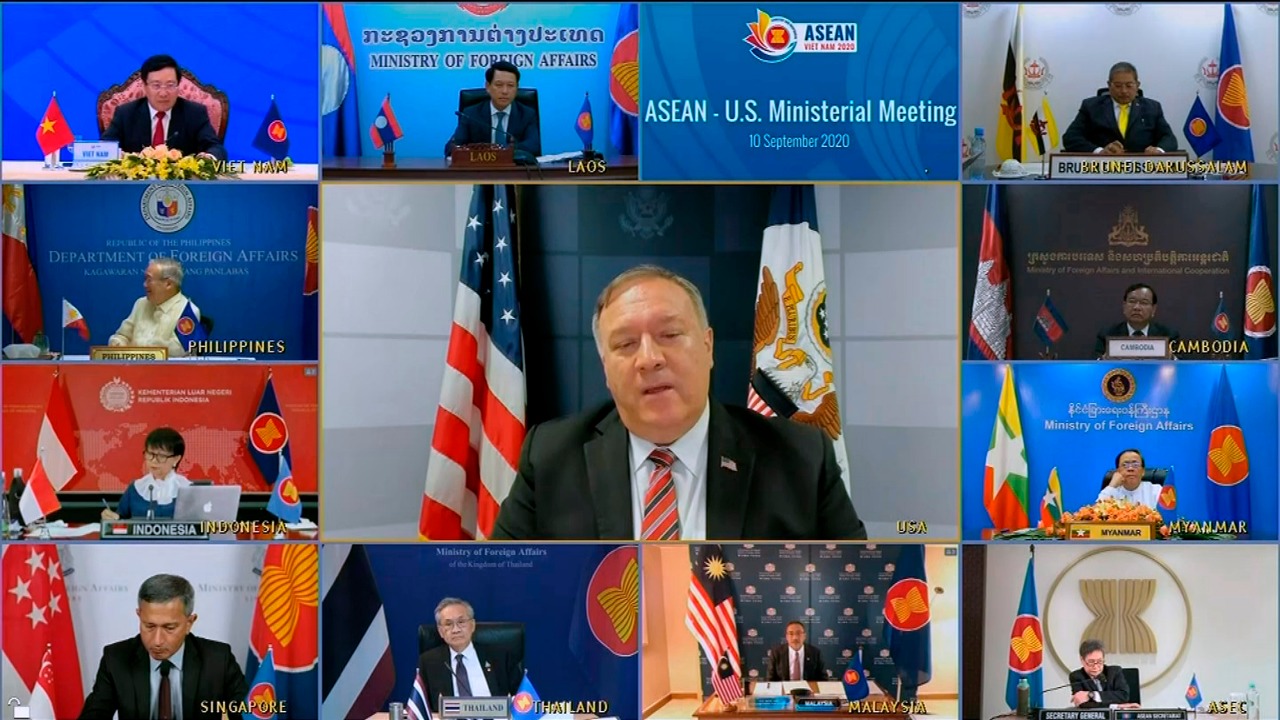Pompeo urges Southeast Asia to shun South China Sea firms

This image taken from video provided by VTV shows U.S. Secretary of State Mike Pompeo speaking during an online meeting with ASEAN foreign ministers on Thursday, Sept. 10, 2020. During the meeting, Pompeo slashed out on China saying Beijing does not respect fundamental democratic values and urged ASEAN nations to act against China’s dominance. (VTV via AP)
Hanoi, Vietnam — Washington’s top diplomat urged Southeast Asia on Thursday to cut ties with Chinese companies helping build islands in the South China Sea, weeks after the US blacklisted two dozen firms working in the disputed waters.
Secretary of State Mike Pompeo’s comments came at a regional Asian summit overshadowed by the US-China rivalry over a range of issues, from trade to the coronavirus.
Tensions are also simmering over the South China Sea, with the US last month sanctioning 24 Chinese state-owned companies it said had helped Beijing’s military buildup in the resource-rich waterway.
Pompeo said it was time for Southeast Asian governments to reconsider their own relationship with firms working in the sea.
“Don’t just speak up, but act,” he told the 10 foreign ministers of the Association of Southeast Asian Nations (ASEAN) during an online summit.
Article continues after this advertisement“Reconsider business dealings with the very state-owned companies that bully ASEAN coastal states in the South China Sea.
Article continues after this advertisement“Don’t let the Chinese Communist party walk over us and our people.”
This year’s ASEAN summit comes days after Beijing launched ballistic missiles in the South China Sea as part of live-fire exercises.
Vietnam, which is chairing the summit, expressed “serious concern” about the recent militarization of the sea.
“This has eroded trust and confidence, increased tension and undermined peace, security, and rule of law in the region,” said Foreign Minister Pham Binh Minh.
But the Philippines already said last week it would not follow the US lead because it needed Chinese investment, even as a fresh dispute between the two nations over Scarborough Shoal — one of the region’s richest fishing grounds — hangs over the talks.
And Chinese Foreign Minister Wang Yi laid blame on the United States for tensions, claiming Washington was “becoming the biggest driver” of the waterway’s militarisation.
Contested waters
China claims the majority of the South China Sea, invoking its so-called nine-dash line to justify what it says are historic rights to the key trade waterway.
Vietnam, the Philippines, Malaysia, Brunei, and Taiwan all contest parts of China’s declared territory in the sea.
Tensions between the US and China have also been exacerbated by concerns over Hong Kong, where Beijing recently imposed a draconian national security law in response to months of civil unrest last year.
Pompeo “joined several countries in raising concerns over… the arrests of pro-democracy students, the year-long postponement of elections, and disqualification of pro-democracy electoral candidates,” according to spokeswoman Morgan Ortagus.